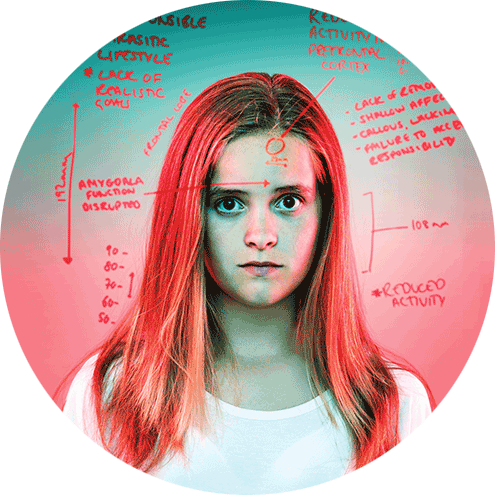In the not-too-distant future, genetic screening of foetuses for traits considered a disability and a burden for society have become compulsory. In the event of a positive result, termination is mandatory. Those who refuse to comply face court orders.
A girl of 12, Jessie (Jessica), carrying the genetics marker of psychopathy, is the protagonist of the play "Tomcat", written by James Rushbrooke and showing at Southwark Playhouse in London. She is the last remaining "specimen" of human beings carrying the genetic traits for psychopathy and, as such, has been the subject of a research project for ten years. Jessie lives in captivity, and is the subject of "observations" by a team of doctors and scientists who want to understand the biological basis of psychopathy.
I had the pleasure of seeing the play last for Halloween with my students from the Bioethics & Society MA programme at King's College London, and to participate in the post-show discussion with the writer, James Rushbrooke, and the producer, Chris Foxon. James Rushbrooke has been able to recreate very powerfully and realistically a not-too-distant future in which our society has lost the values of freedom and respect for humanity as a trade off for a "healthy" and safe society free of disability and disorders. The play prompts us to reflect: if we had the technology, should we get rid of the traits that cause a burden to society? These are very real questions that we need to face; think of genetic screening for Down's Syndrome, cystic fibrosis, or deafness.What counts as an illness, or disability? Is there a value in conserving a disability? These questions are currently discussed in academia (see for example the debate on the American Journal of Bioethics in response to the target article "Imposing genetic diversity" by Australian philosopher Rob Sparrow), but are questions for all of us to discuss now as they pertain to the future of the human species.
Indeed, we are already starting to see some of these tendencies towards healthy lifestyles at all costs at play in our society. For example, the writer James Rushbrooke said during the post-show discussion that the idea for the play came from the genetic screening programmes for Down's Syndrome, and the reactions by parents of individuals with Down's Syndrome against such programmes. James wondered what a future in which we eradicate such traits from society would be like, and what we would lose of our 'humanity' in such a world.
One of the most powerful scenes (spoiler alert!) for me was when Jessie asks permission to touch Tom's (her key-worker) face. Jessie is denied any contact with her key-worker and doctors out of fear that she could harm them, and she likes to draw pictures of Tom's face to remember him when he is not (working...) with her. Because of the heavy sedatives that she is given (to allow brain scans without her consent) she has forgotten his face and is unable to draw (who is displaying lack of empathy now? Jess or her researchers?). Her condition is her identity; by wiping out the trait, her own identity is wiped out. Jess echoes some of the arguments made by individuals with autism spectrum disorders, who reject the label of disability and pharmaceutical treatments and want to be considered "neurodiverse" as they identify with their condition.
The play leaves you thinking about the future, and the present, of humanity, as it prompts many reflections on our current society: what, and to what extent, are we ready to trade off for a "healthy" and "safe" society? Are we ready to relinquish freedom and respect for persons in exchange for a human species free from illnesses, or disabilities? What counts as a "good" life? And who decides that only a life free from illnesses or disabilities is a "good" life?
I highly recommend this play as it prompts reflections not only about the future of humanity but also about some of our current way of thinking on disability, illness, and identity. Says Jess: "I don't want to be me if I can't be me". Isn't that the case for all of us?
For more information about the play see here: http://southwarkplayhouse.co.uk/the-little/tomcat/

